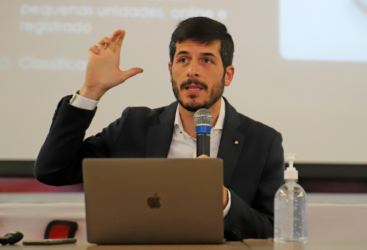Guided by Luciana Bruno
🄿🅃
A new public policy is creating jobs and reducing poverty in Araraquara, Brazil. The city has assisted in the establishment of two platform cooperatives, which address the low wages and precarious work of the gig economy, particularly during the pandemic. The success of Araraquara shows that supportive policies can effectively encourage these businesses to exist.
From Araraquara, Brazil: A Model for Public Policies in the Creation of Platform Cooperatives
Need a Ride? Check Out Brazil’s Newest Driver Cooperative!
The Coopera Araraquara government program is a public policy that aims to encourage the creation, development, consolidation, sustainability and expansion of cooperatives and other associative groups, through a public solidarity business incubator. Vivian Pacheco, as the program manager, is supporting the creation of a driver’s cooperative (Morada Car) and a food distribution cooperative (Morada Express) in the city of Araraquara in the state of São Paulo. The local government sees the solidarity economy as an important way for social and economic development. By hiring cooperatives, the city is also able to help improve its public-service offerings.
🄿🅃
A New Way of Creating Jobs in Brazil
The Labor Prosecution Service in Brazil is an important part of the country’s legal system. The Prosecution Service is responsible for enforcing labor laws and protecting workers’ rights. As public prosecutor, Renan Kalil is a vocal supporter of workers’ rights and has advocated for better working conditions and stronger anti-exploitation safeguards. He has also criticized the impact of the pandemic on Brazilian workers, particularly those in the informal sector. Kalil has recently advocated for the expansion of platform cooperatives as a means of creating more secure and sustainable jobs, thereby improving the lives of Brazilian workers while also reducing poverty.
🄿🅃
Platform Cooperatives within Platform Regulation
Alexandre Costa Barbosa, a specialist advisor for the Brazilian Internet Steering Committee, will present the scope of platform regulation being discussed in Brazil, considering the typology of platforms and the extent to which platform cooperatives could be strengthened. He will discuss platform competition, as well as the limits of platform cooperatives. Understanding the various types of platform coops allows us to create better policies to support them. Furthermore, by understanding platform competition, we can learn how to level the playing field so that cooperatives can thrive. Finally, he will introduce the multisectoral aspect of Internet Governance and the leading role of Brazil with this regard, bringing reflections for platform cooperatives governance.
🄿🅃
File Swap
Would you like to dig deeper, learn more about the discussed topics, or have documents to share? Download PDFs of the presentations, background readings, and/or upload your own materials to this folder
***Archival video of this segment is available here.***
Speakers
-

Luciana Bruno Brazilian journalist
-

Vivian Alves Pacheco Coordinator of Work and of Creative and Solidarity Economy, Municipality of Araraquara
-

Renan Kalil National Deputy Head, Combat on Labor Relations Dissimulations, Labor Prosecution Service
-

Alexandre Barbosa Specialist Advisor, Brazilian Internet Steering Committee